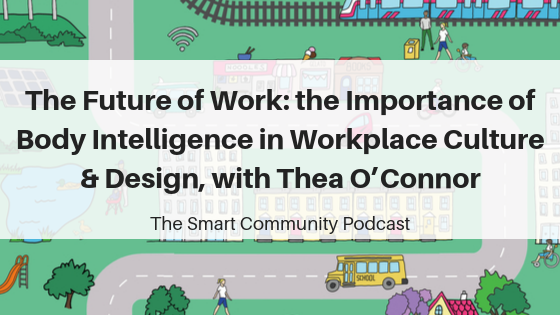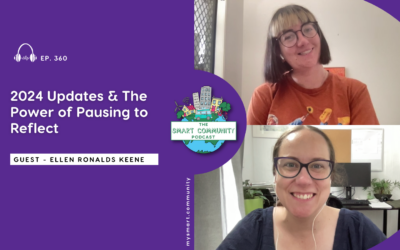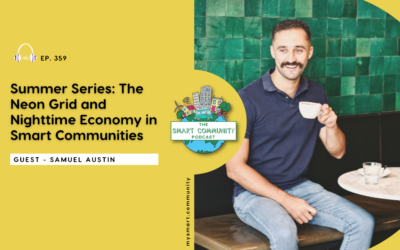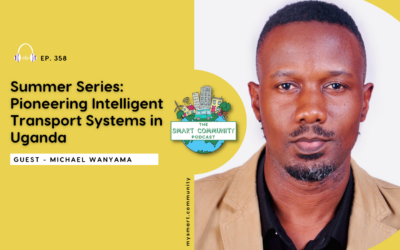In this episode, I had a wonderful chat with Thea O’Connor, a body advocate and Workplace Wellbeing and Productivity Advisor. Thea and I met last year at the Bellingen Ignite conference run but the RDA Mid-North Coast and it was great to chat again. In this episode Thea shares with us what sparked her interest in the link between technology and health, and the impacts of workplace culture on health and also productivity. She tells us why we need body intelligence in our personal lives and in our workplaces, as well as why we need more power naps! Thea shares with us some techniques that can improve the way we work into the future and cultivate Smarter workplaces now, as well as some tips and tricks to combat white collar fatigue. We also have a really interesting discussion about the opportunities and challenges in the uptake of designing workplaces to support human bodies and brains, and the dangers of the intense, hustle culture in the startup scene. We finish our chat discussing the emerging trend of designing algorithms and apps with the body in mind, and also the experiment I’m doing to try to break my phone addiction. As always, I hope you enjoy listening to this episode as much as I enjoyed making it.
Listen here:
What we cover in this episode:
- Thea’s background as a dietitian that eventually led to her work now in workplace health
- What sparked Thea’s interest in the link between technology and health
- The health impacts of workplace culture and a history of separation of mind + body
- Why we need body intelligence in our personal lives and in our workplaces
- The power of the power nap
- Techniques that can improve the way we work into the future and cultivate Smarter workplaces now
- The opportunities and challenges in the uptake of designing workplaces to support human bodies and brains
- The need to factor in adequate recovery time in order to work effectively, and the impact that short term contracts and the gig economy has on this
- The dangers of intense, hustle culture in the startup scene and the resulting problems with burnout and mental health problems
- Thea’s tips and tricks to combat white collar fatigue
- Why we should choose technology based on what we want and need to augment our human experience, instead of letting technology choose for us
- Breaking our addiction to our phones and the personal experiment Zoe is doing with hers
- The emerging trend of considering impacts on the human body in the early design of algorithms, apps and emerging technology
Quotes:
“I really became interested in how our relationship with technology affects our physiology. We’ve known for quite a while now that as technology has taken over manual work, that’s really contributed to things like the big rise in overweight. But now we’re seeing more and more impacts of that intense, sedentary screen based computer work. And it’s leading to a whole range of problems, everything from RSI to tech neck…even through to our breathing. I see the many health challenges that technology contributes towards.”
In our work culture, we really almost encourage people to disconnect from their bodies, or to do things like rely on artificial stimulation to get through the day like caffeine, rather than work in tune with its natural rhythms…We need to rebuild trust in the body, learn to live in more body intelligent ways, both for the sake of ourselves, but also our workplace productivity.”
“If we’re talking about how can we cultivate Smarter workplaces, I think the key thing that we need to do is to educate people about the role of the body not just in our physical health, but how it actually underpins some of the key workplace capabilities that we need now and into the future.”
AUDIOGRAM: 9.02 – 10.25 “I’ll ask people, you know, given that technology is taking over cognitive labor now, as well as manual labor, what are some of the key skills and attributes that we’re going to need to thrive, and, you know, the participants will come back with things like the people skills, the communication skills going to be more important than ever, we’re still going to have to talk to clients, manage relationships, inspire our teams, emotional intelligence as part of that. And also name things around, you know, innovation, we all know that you have to come up with good ideas for solving complex problems, we need to be agile, to deal with change, etc, etc. And then when we actually look at what happens to those essential capabilities, when we don’t take care of the body, you actually discover it well, things like communication skills, there’s no way you can be a great communicator, there’s no way you can regulate your emotions. If you’ve only had four hours sleep, you will not be able to think creatively or flexibly. If your prefrontal cortex is effective tiredness and fatigue, the prefrontal cortex, which does all you know, that higher order thinking, that’s the part of the brain, that’s the most vulnerable to tiredness. And I go through and show how actually a body’s physiology actually impacts all of those key capabilities that not just my workshop participants, but futures predict, are going to be the most important. So we have to really get that body intelligence is the basis of those other intelligences.”
“Given that the body is the foundation of our lives, and it’s home to all of those workplace capabilities, we need to take care of how we design our days around the body. We need to use a body-centered design process… In most workplaces, we actually work in direct opposition to the design of our bodies, so we’re undermining our key instrument for living and working.”
“If we were to work in tune with those [body] rhythms, we’re going to have to stop during the working day. And the default position has become work flat out…and learning how to insert some pauses and commas into your day, that’s more of a challenge. It does take a concerted effort between managers and teams to change those norms.”
“We’re learning more about how quite short recovery breaks throughout the day, anything from 1-10 minutes, can actually make a measurable difference to your cognition and also your energy levels. There’s more and more science coming out around that and I think that’s going to be the essential skill for people working in this more flexible, unpredictable economy.”
“We know that burnout is a massive shadow issue and that mental health rates are higher amongst startup entrepreneurs. So it’s a massive issue but the culture is so intense. People don’t want to take time out for anything.”
“When you start to show people the science behind how severely white collar fatigue can impair those essential capabilities, that often does make people stop and think. Then you need a [workplace] culture that’s going to support [changing that].”
“In order to tackle [our attachment to our phones] we do need a degree of self discipline or self regulation and, and we need to expect that it’s going to be uncomfortable… Expect to feel anxious, that’s a normal part of tackling an addiction.”
“The body is our home, our foundation. It’s the only vehicle that we have for living [and working]. As we’re getting all starry eyed about artificial intelligence, we tend to forget how amazingly intelligent the body is and we should be listening to it, learning from it and respecting it.”
Links:
UQ’s Be Upstanding website
Buddhify meditation and mindfulness app
Connect:
Find the full show notes at: www.mysmart.community
Connect with Thea on LinkedIn or at Thea.com.au
Connect with me via email: hello@mysmart.community
Connect with My Smart Community via LinkedIn or Twitter and watch on YouTube
Podcast Production by Perk Digital






0 Comments